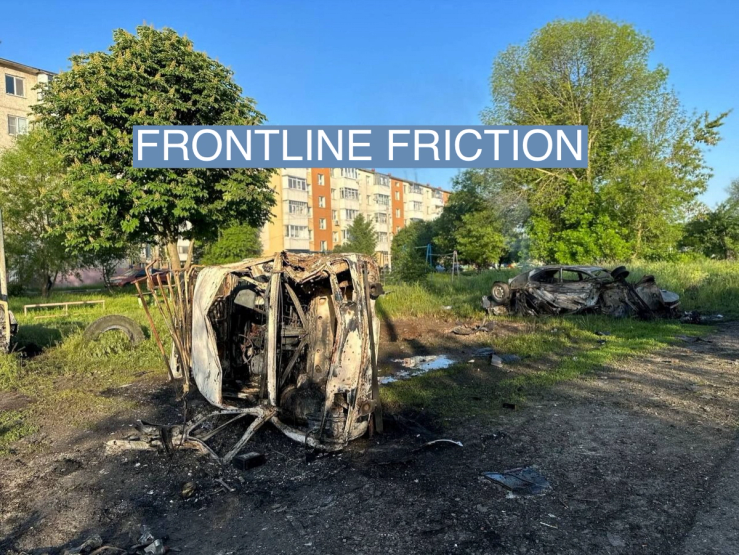The News
Journalists covering the Russian invasion of Ukraine are engaged in a running, low-grade conflict with the Ukrainian government, which many believe uses access and accreditation to shape their stories.
Articles and broadcasts from outlets including NBC News, The New York Times, CNN, The New Yorker, and the Ukrainian digital broadcaster Hromadske have led to journalists having their credentials threatened, revoked, or denied over charges they’ve broken rules imposed by Ukrainian minders.
The largely unreported conflict spilled briefly into public in late May when the well-known Ukrainian photographer Maxim Dondyuk complained on Instagram that the military press office was threatening to revoke his accreditation after his haunting images appeared in a New Yorker article portraying the trench life of Ukrainian draftees on the front line..
“The authorities only allow press tours with press officers, where they show off in front of the camera and are afraid to show the real situation,” Dondyuk wrote in furious posts to Instagram, which he subsequently deleted, adding that Ukrainian authorities were threatening to strip his accreditation. “Are you ready to read only stupid propaganda?”
The New Yorker blowup is the latest in a running series of conflicts between the media covering the war and the Ukrainian authorities, which have had to ramp up a massive press operation as they fight for their country’s life against an invader four times their size. Their military press office vets journalists and issues passes which allow them to travel to certain areas, often with press handlers, and to interview officials, after signing a document stating that journalists will abide by rules outlined by the military.
One particular target of official Ukrainian ire has been the New York Times reporter Thomas Gibbons-Neff, a former U.S. Marine who covers the Ukrainian military closely, and who drew particular anger when he reported that the Ukrainians were using banned cluster munitions. He has had his credentials revoked and his renewal denied in separate incidents, a Times spokesperson said, though they were ultimately re-issued.
Another tense incident began this February, when an NBC News crew rode the train from Moscow to Crimea.
“This is our land,” a pro-Russian resident of Sevastopol told correspondent Keir Simmons for the February 28 broadcast. And her words “echoed those of most people NBC News spoke to in Crimea this week,” the network reported. The segment, conducted amid the Russian occupation, was a rare public relations coup for the Russian side.
In response to the broadcast, the Ukrainian government revoked NBC’s credentials, effectively confining their local team to a Kyiv hotel.
The Crimea visit was “a violation of Ukrainian legislation and we don’t want other Western media companies doing the same,” a foreign ministry spokesman, Oleg Nikolenko, told me Friday.
“If they want to go to Crimea to report, they can go to Crimea through Ukraine,” he said, acknowledging that because of the hostilities, “unfortunately it is currently impossible.”
Nikolenko and the official email account of the Ukrainian Armed Forces both heatedly denied they use accreditation to shape coverage.
“The Armed Forces of Ukraine do not have any tensions with the USA or any other media,” the military public relations department said in an unsigned email.
NBC did not apologize for the incident, a network official said, but pointed out to the Ukrainians that different reporting teams were involved, and eventually got its credentials restored.
A Magnum photographer, Antoine D’Agata, also lost his ability to report in Ukraine after a photo essay in the New York Times Magazine that documented soldiers’ psychological trauma from inside a mental health facility, according to two people familiar with the incident. D’Agata and Magnum didn’t respond to inquiries.
Ukrainian security services have also paid particular attention to local journalists who covered the last round of conflict in the country’s east and might have had contact with separatists, two journalists said.
The government has asked journalists seeking accreditation to take lie detector tests to prove they aren’t Russian agents, three journalists in Kyiv said.
Know More
The heated clashes have remained largely behind the scenes because the credentials are vital to report from the country, and journalists worry that a public conflict might further threaten their access. Most of the journalists from Western and Ukrainian news organizations who have clashed with their handlers spoke on the condition of anonymity.
One told me bluntly he didn’t want to be quoted in this story because “there’s very little upside and some chance that they might snatch my press credential.”
Ukrainian journalists face more intense pressure than foreign correspondents to present an optimistic view of a conflict their friends and family are dying in, noted Nastya Stanko, a correspondent for Hromadske. She was among a number of journalists, including from CNN, who had their credentials temporarily suspended after broadcasting from Kherson after the Ukrainian government had retaken it but before they had permission.
“It’s more important to have journalists who can honestly show what happens on the front lines, and I’m not sure it’s clear to everyone in the army,” she said.
Ben’s view
Information has always been a weapon of war, and the government of Volodymyr Zelenskyy has been virtuosic at telling the country’s story. The Western media’s skirmishes with Ukrainian handlers reflect the underlying reality that most Western news outlets treat Ukrainian soldiers as, at some level, “our boys.” The fights over access are familiar to U.S. reporters from American wars. And Ukraine’s restrictions do not approach those imposed on the US press in the 20th Century by its own government; the Ohio State historian Christopher Nichols noted in an interview: During the First World War, almost 100 US journalists lost “’mailing privileges” when censors ruled they were undermining the war effort.
The journalistic tensions do reflect a deeper friction: American, French, or British journalists write for publics who are largely sympathetic to Ukraine — but whose interests aren’t identical. The subjects most likely to draw ire from Kyiv include morale, casualties, and the role of fighters with far right ties in the war effort, a favorite Russian propaganda topic.
Crimea is also high on the list. Ukrainian officials have promised to liberate the occupied territory. But they may face pressure from the West for a settlement that would leave Crimea in Russian hands.
Truth may not exactly have been the first casualty in a war that has been broadcast on social media with unprecedented clarity. But the behind-the-scenes fight for access shapes some of what Western readers see and read.
The View From Moscow
The tensions between the government and media in Ukraine aren’t comparable to Russia’s sweeping crackdown on independent media, which now operates from exile. Foreign journalists work with relative freedom in Ukraine, while the handful remaining in Russia operate with extreme caution, particularly after Russia’s arrest of the Wall Street Journal reporter Evan Gershkovich.
Room for Disagreement
Ukrainians know their interests aren’t identical to their allies’. Stanko wrote powerfully in Stranger’s Guide of her ambivalence about the Western media, and with the trend of migrations from international outlets’ Moscow bureaus to Kyiv.
“All of those who claim to be wise and moral, those who always claimed to be for rights, democracy and freedom are starting to make me angry. Especially the Western liberal media,” she wrote, furious at the “assumption that Ukraine is somewhere in Russia’s shadow, in its orbit, in its sphere of influence, and that if you lived and worked in Moscow and know Russia, then you will easily assimilate here in Kyiv.”
Notable
- “The telemarathon is the information war equivalent of our anti-aircraft systems,” a Ukrainian media monitor told The Guardian.
- President Zelenskyy expressed his anger over the Discord Leaks in an interview with The Washington Post: “You are releasing some sort of information that does not help our state to attack and does not help us to defend our state…. I don’t quite understand your goal. Is your goal to help Russia?”


